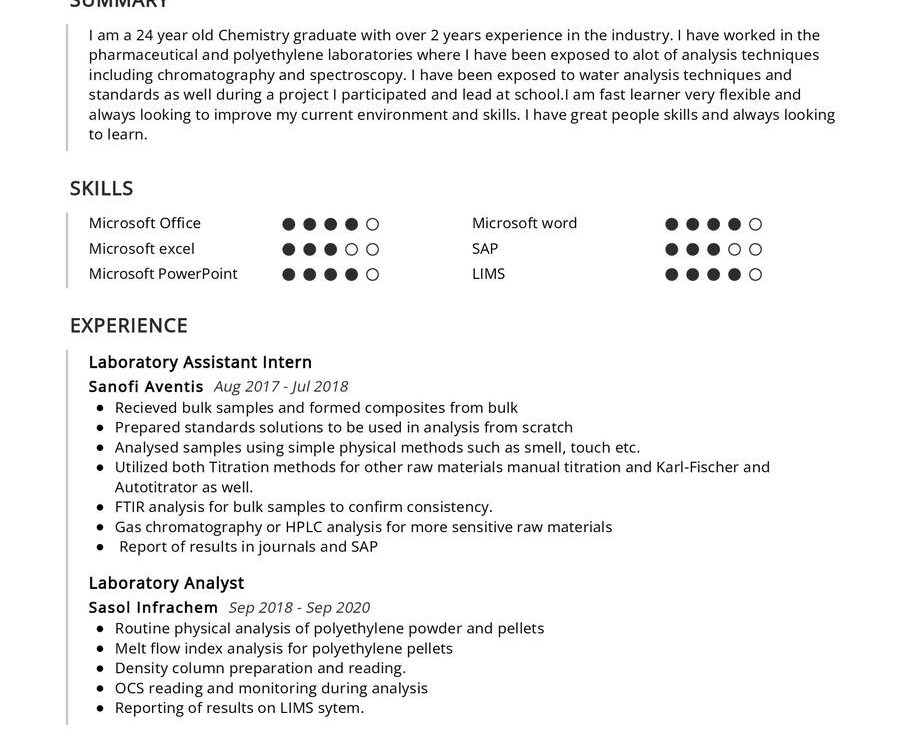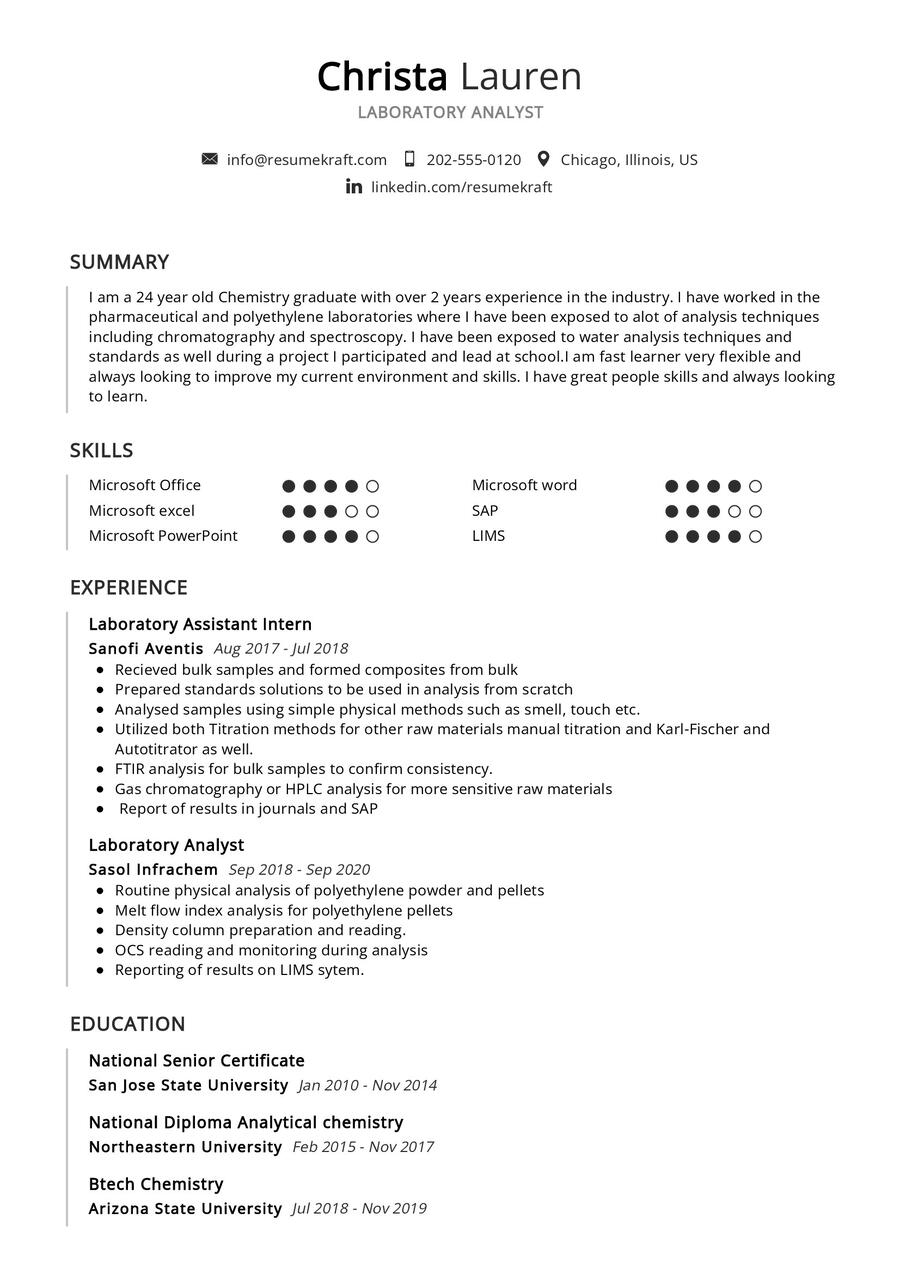Exploring the Role of a Laboratory Analyst
As the scientific landscape continues to advance, the position of a Laboratory Analyst has become integral in various industries. This role is a fusion of analytical skills and scientific expertise, playing a crucial part in ensuring the accuracy and reliability of laboratory results. Let’s dive deeper into the multifaceted role of a Laboratory Analyst, understanding the skills and qualifications required to excel in this field.
Job Requirements for a Laboratory Analyst
Becoming a Laboratory Analyst involves meeting specific criteria, encompassing a blend of education, technical proficiency, and attention to detail. Let’s explore the prerequisites one needs to fulfill to embrace the role of a Laboratory Analyst:
- A Bachelor’s or Master’s degree in Chemistry, Biology, or a related field, demonstrating a solid foundation in the scientific domain.
- Expertise in laboratory techniques, including but not limited to chromatography, spectroscopy, and microscopy.
- Hands-on experience with laboratory equipment and instruments, showcasing practical skills in conducting experiments and analyses.
- Attention to detail and precision, essential for ensuring accurate and reliable laboratory results.
- Strong analytical and problem-solving skills, honed through coursework and practical laboratory experience.
- Effective communication skills to convey findings and collaborate with other team members.
Obtaining additional certifications related to specific laboratory techniques or safety protocols can enhance your profile in the competitive job market.
Responsibilities of a Laboratory Analyst
The role of a Laboratory Analyst is diverse, requiring a combination of technical expertise and meticulous work. Let’s unravel the core responsibilities that define this role, each contributing to the precision and reliability of laboratory analyses:
- Conducting various laboratory tests and experiments, following established procedures and protocols.
- Analyzing and interpreting data, ensuring accuracy and reliability in the results.
- Maintaining and calibrating laboratory equipment to guarantee optimal performance.
- Collaborating with cross-functional teams to share findings and contribute to broader scientific projects.
- Ensuring compliance with safety regulations and laboratory protocols to maintain a secure working environment.
- Documenting and reporting results, creating comprehensive reports for internal use or external publication.
Each responsibility is a step toward maintaining the highest standards of quality in laboratory analyses.
Laboratory Analyst CV Writing Tips
Crafting a CV that stands out in the competitive field of Laboratory Analysis is crucial. Your CV is a reflection of your academic and professional journey, and here are some tips to help you present it effectively:
- Highlight your laboratory skills, emphasizing specific techniques and instruments you are proficient in.
- Showcase any research projects or publications related to your work as a Laboratory Analyst.
- Quantify your achievements, providing specific examples of successful analyses or contributions to scientific projects.
- List relevant certifications, demonstrating your commitment to ongoing professional development.
- Customize your CV for each application, aligning your skills and experiences with the specific requirements of the job.
Each tip is a tool to help you craft a compelling CV that highlights your strengths and qualifications as a Laboratory Analyst.
Laboratory Analyst CV Summary Examples
Your CV summary is the opening statement of your professional story, setting the stage for the reader. It should be a concise yet powerful snapshot of your expertise and contributions. Here are some examples to inspire you:
- “Dedicated Laboratory Analyst with a Master’s degree in Chemistry and five years of hands-on experience in analytical techniques, contributing to groundbreaking research projects.”
- “Results-driven Laboratory Analyst specializing in microbiological analyses, known for precision and attention to detail, with a proven track record of delivering accurate and reliable results.”
- “Detail-oriented Laboratory Analyst with a strong foundation in molecular biology, adept at conducting complex experiments and collaborating with interdisciplinary teams.”
Each summary is a window into your professional journey, offering a glimpse of your expertise and passion as a Laboratory Analyst.
Create a Strong Experience Section for Your Laboratory Analyst CV
Your experience section is the heart of your CV, showcasing the depth of your professional journey. Here are some examples to guide you in presenting your experiences effectively:
- “Led a team of analysts in a high-throughput laboratory, achieving a 15% increase in efficiency through process optimization.”
- “Contributed to a research project on environmental sustainability, conducting comprehensive analyses that informed policy recommendations.”
- “Developed and implemented safety protocols, ensuring a secure and compliant laboratory environment for all team members.”
Each experience is a chapter in your professional book, narrating stories of challenges met, solutions found, and successes achieved as a Laboratory Analyst.
Education Section for Your Laboratory Analyst CV
Your educational background is the foundation of your career as a Laboratory Analyst. Here’s how you can present your academic achievements in your CV:
- Master of Science in Chemistry, XYZ University, a journey of in-depth learning and specialization, 2018.
- Bachelor of Science in Biology, ABC University, the cornerstone of your scientific education, 2014.
- Certified Laboratory Professional (CLP), a recognition of your expertise in laboratory practices, 2019.
Each educational qualification is a stepping stone, contributing to your success as a Laboratory Analyst.
Key Skills for Your Laboratory Analyst CV
Your skill set is a toolbox equipped with a diverse range of tools honed over the years. It is a showcase of your abilities, both innate and acquired. Let’s list down the essential skills that a Laboratory Analyst should possess:
Technical Skills:
- Proficiency in laboratory techniques, including but not limited to chromatography, spectroscopy, and microscopy.
- Hands-on experience with laboratory equipment and instruments, showcasing practical skills in conducting experiments.
- Analytical and problem-solving skills, essential for ensuring accurate and reliable laboratory results.
- Knowledge of safety regulations and laboratory protocols to maintain a secure working environment.
Soft Skills:
- Effective communication skills to convey findings and collaborate with other team members.
- Attention to detail and precision, crucial for maintaining the highest standards of quality in laboratory analyses.
- Team collaboration, the ability to work seamlessly with cross-functional teams on scientific projects.
Each skill is a tool, aiding you in providing exceptional analyses and contributing to scientific advancements as a Laboratory Analyst.
Common Mistakes to Avoid When Writing a Laboratory Analyst CV
As you craft your CV, it is essential to avoid common pitfalls that can hinder your journey to securing your dream job. Here are some mistakes often seen in CVs and how to avoid them:
- Using a generic CV for all applications, a strategy that fails to highlight your unique fit for each role.
- Listing duties without showcasing achievements, providing a narrative that lacks depth and impact.
- Omitting relevant certifications or training, missing an opportunity to demonstrate your commitment to professional development.
- Overlooking the importance of a well-crafted CV summary, a crucial element that sets the tone for the rest of the document.
- Failing to proofread, a mistake that can leave a negative impression on potential employers.
Each mistake is a potential stumbling block; avoid them to craft a CV that effectively showcases your qualifications and strengths as a Laboratory Analyst.
Key Takeaways for Your Laboratory Analyst CV
As we conclude this comprehensive guide, let’s recap the key points to keep in mind while crafting your Laboratory Analyst CV:
- Emphasize your laboratory skills, highlighting specific techniques and instruments you are proficient in.
- Quantify your achievements, providing specific examples of successful analyses or contributions to scientific projects.
- Customize your CV for each application, aligning your skills and experiences with the specific requirements of the job.
- Include relevant certifications, demonstrating your commitment to ongoing professional development.
Finally, feel free to utilize resources like AI CV Builder, CV Design, CV Samples, CV Examples, CV Skills, CV Help, CV Synonyms, and Job Responsibilities to create a standout application and prepare for the Laboratory Analyst job interview.
Armed with these insights and tips, you are now ready to craft a CV that is a true reflection of your journey, your skills, and your aspirations. Remember, your CV is not just a document; it is a canvas where you paint your professional story, a story of growth, learning, and contribution to the field of Laboratory Analysis. Best of luck!


